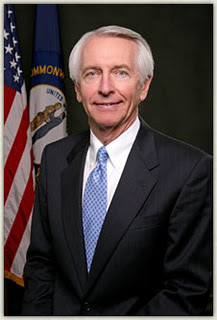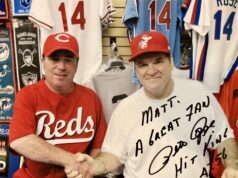Kentucky expects to receive about $3 billion in federal stimulus money over 27 months, Gov. Steve Beshear told CNN today in an interview that aired at 8:30 a.m. EST.
That compares to a total General Fund Appropriations budget for the Commonwealth of about $9.6 billion for 2009. And it’s several (maybe $10 or $17) billion less than say, Chrysler has gotten just to keep its holding company in tee times.
It’s about one Oprah Winfrey or one Steven Spielberg, but less than the two Steve Jobses that Massachusetts is slated to receive.
And $2 of every $3 of that $3 billion will be used to maintain current elements of education, healthcare, etc. for Kentuckians, with about $1 of every $3 available for stimulus, Beshear said, noting that preserving jobs for teachers, healthcare workers and others is a method of stimulus. “Part of stimulating ths economy is keeping people at work,” he said.
Beshear gave the details about how Kentucky would use federal stimulus money in an interview with T.J. Holmes on CNN’s “Saturday Morning” program. Beshear was in Washington for the NGA, the National Governors’ Association meeting.
Beshear said that they expected to receive the money “soon,” when jokingly asked by Holmes if he would be leaving Washington “with a check”. “The legislature and I are working on a list of transportation projects.” That list should be done by the end of next week, the governor said.
Beshear told Holmes “We all better be smart and not create new programs that are not sustainable,” and assured him that Kentucky planned to use its allocation wisely, in response to a question about some of the fears about the stimulus money being misused.
(For those who have been following the story of Lexington Mayor Jim Newberry’s list requesting about half a billion for more than 160 “shovel-ready” projects, we can now determine that if every item on Lexington’s list were approved, it would receive about half of all the remaining one-third of stimulus money that didn’t go to maintenance. That’s not going to happen. But just for perspective.)
How did Beshear do in the national spotlight? With a light blue tie that sparked his bright blue eyes and a more careful and more Eastern establishment enunciation that I think I usually note, he seemed to do fine. He had answers and was deliberate in beginning each response with a full context.
He said that Kentucky’s legislature and he have already done what Obama is trying to do with the Congress — “put aside our bickering and come together” — to solve the problem. He mentioned the recent coming together on the alcohol and tobacco tax increases to help plug the $456 million state deficit.
He played along well as Holmes made him the straight man of a continuing Earth, Wind and Fire joke, complete with very grainy performance video — Earth, Wind and Fire is performing at the White 
(I’m pretty sure Ace would publish any photos capturing Beshear getting down to “Shining Star.” On the cover.)
Holmes, a smart and likable interviewer who has chosen two wrong ties for two weeks running, politely asked the governor how the ice storm recovery was going —as he had done a phoner with him from the natural disaster that created disaster declarations in 102 of Kentucky’s 120 counties.
Beshear said that the state was digging out as best as it could, highlighting the speed with which he asked for and received disaster declaration from President Obama and mentioning the FEMA response to the first major disaster handled by the first post-Katrina president.
But when asked to identify the one priority of the state by a native Kentuckian who had written in a question on Facebook, Beshear definitely played the politician, answering a “top priority” question with a list that would please everybody. Nonetheless, it was good to hear that the first item on the laundry list was “education.”
He was not drinking a Mountain Dew.
Urch is an assistant professor of new media in the School of Journalism and Telecommunications at University of Kentucky.





